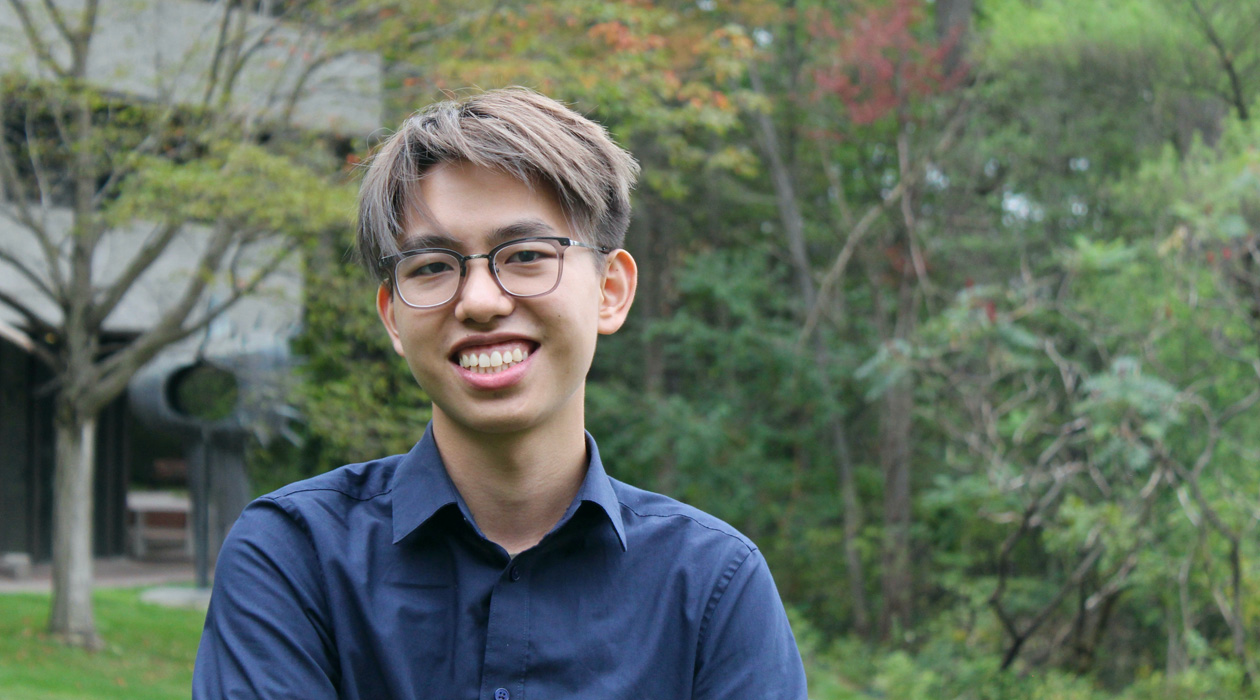IGB Profile: Jeff Chen

“Things are as they are. Looking out into the universe at night, we make no comparisons between right and wrong stars, nor between well and badly arranged constellations.” ― Alan Watts / Jeff Chen
Growing up in Vancouver, Canada, you could find Jeff Chen visiting the beach to observe fish, starfish, and algae in the tide pools. Throughout his life, Chen had a natural tendency to wonder how the world around him worked. Today, he is a graduate student in chemical biology at the University of Illinois Urbana-Champaign, investigating metalloenzymes to understand their chemistry and function in biology.
“My interest in science really built over time. My grandma has a dairy farm in Taiwan, so we were raised around animals, and I felt really connected to nature,” said Chen. “We always had pets, and whenever we went to visit, my grandma would give us duck eggs to hatch.”
In elementary school, Chen enjoyed observing frogs hatch and grow; by fourth grade he aspired to be a marine biologist. “I had caterpillars in jars, and I wanted to know how they moved—a classic biologist story,” he laughed.
While he didn’t end up becoming a marine biologist, Chen’s interest in biology eventually led him to the University of British Columbia to study biochemistry. He performed undergraduate research in plant biology and investigated different systems including microalgae, the pawpaw fruit, and poplar trees.
“I really liked plant biology, and I wanted to learn more about chemistry because plants are really good chemists.”
Chen’s research experience cemented his excitement for science and prompted him to pursue graduate programs. He obtained his master’s degree in cell and systems biology from the University of Toronto, where he researched poplar trees and cuticular waxes—chemicals coating the outer, epidermal layer of a plant. In 2022, he moved to Illinois to start his PhD program in chemistry.
Although the miles of corn fields were a bit of a shock coming from larger cities, Chen looked forward to joining the large research scene at Illinois, with an abundance of funding and collaboration opportunities. “The chemistry department is strong at Illinois, and there are so many labs doing cool science that I could have joined.”
Recommended to him by one of his undergraduate research advisors, he decided to join Wilfred van der Donk’s (MMG leader) group, where Chen now performs basic science research to further understand metalloenzymes and the reactions they catalyze using iron in their active sites. “I think a challenging aspect of our work is all the different techniques we use since our lab is at the interface of biology and chemistry. I had to learn how to grow different strains of bacteria, but I also had to learn different chemical techniques like LC-MS and 2D-NMR.”
On top of research, Chen prioritizes mentoring students and participating in scientific outreach. “I always feel like giving back because a lot of people have mentored me and taught me so many things.” At Illinois, he spends his time mentoring undergraduate students in the van der Donk lab where Chen enjoys simplifying the complex bioinorganic chemistry topics to teach students. He also has served as chair of the East Central Illinois section of the American Chemical Society Younger Chemists Committee to provide networking and professional development activities for students and postdoctoral researchers on campus.
Beyond science, Chen has always loved history. When he was young, Chen was a top student in history at his school and was selected to take part in a national history competition. This love for learning about the past has now evolved into a hobby to escape the stress of graduate school. “I really like old books. The older, the better,” Chen said. “I like exploring small towns and browsing in their antique shops. I really like the antique mall in Springfield; my sister got a crystal dog sculpture there which was a cool find.” In his free time, he also enjoys hanging out with friends and bouldering.
Chen is still figuring out what he wants to do in the future after graduate school and is considering career options in both academia and industry. However, he is confident that he will always want to be involved in mentoring. His advice to new and young graduate students: “Graduate school is challenging at times, so it is good to build a support network, both in and out of the lab. It's especially helpful when stressful degree requirements come up, like the preliminary exam, because you can practice with friends to help you prepare and ease your nerves.”
